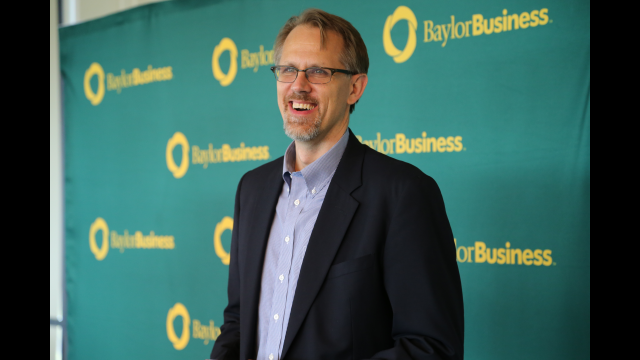By Eric M. Eckert and Jeff Brumley
Higher levels of spiritual capital — the motivation, energy and work ethic one may find from a relationship with God — have a positive effect on business success, employment and innovation in developing countries, according to new research from Baylor University’s Hankamer School of Business.
An American businessmen told Baptist News Global that the findings of the study — “The Role of Spiritual Capital in Innovation and Performance: Evidence from Developing Economies” — appear to apply in developing countries as well.

Researchers surveyed groups of people in two cities — Nairobi, Kenya, and Surabaya, Indonesia — who had received microfinance loans from banks and credit organizations to start various businesses, such as vegetable stands, bike repair, barber shops and small farms.
The study is published in the journal Entrepreneurship Theory and Practice.
“We found that after controlling for other forms of capital, spiritual capital is still impacting their business’ success,” said study co-author Mitchell J. Neubert, Ph.D., management professor and Chavanne Chair of Christian Ethics in Business. “Businesses are growing. More people want to work with them. They’re getting more sales. They’re having the confidence to try new things and venture out.”
Faith-based business intuition
All of those findings sounded familiar to successful American businessmen interviewed by BNG.
Bill McConnell said his faith-influenced ethics has helped him succeed as a partner in a Knoxville, Tenn., company that manufactures industrial environmental equipment.

“My sense of ethics comes from my faith,” said McConnell, a former moderator of the Cooperative Baptist Fellowship and a member of Central Baptist Church in Knoxville. Customers have told him that his integrity has kept them coming back.
“They see that I’m honest and they see that I treat them fairly and that I care about their well being,” he said.
McConnell said prayer has helped him in business, too. He recalled difficult situations at work in which he felt himself being guided to wait before making certain decisions. Such situations always resolved themselves.
“I have to believe there was some guidance there because of the faith I have,” he said. “That’s the kind of thing you can’t really explain.”
Pensacola, Fla., businessman Allen Turner said his Christian faith has taught him to see Christ in his customers and employees throughout the years that his company has grown.

Faith has also been instrumental in helping him develop business strategy and advertising campaigns, said Turner, a member of First Baptist Church in Pensacola and owner of Hyundai, Chevrolet and used-car dealerships.
“God has helped me make decisions that made me look like a hero,” Turner said. “It comes from listening to the spirit inside of you.”
It’s all a natural outgrowth from a belief that financial and business successes are gifts from God, he said.
“When God blesses you with business and people and capital, you want to be a good steward of those things.”
Investing spiritual capital
The Baylor study explored the relationship between commerce and faith by measuring the success of these business operations based on total sales, numbers of employees and innovation. A total of 282 surveys — 114 from Kenya and 168 from Indonesia — were analyzed.
After accounting for financial capital (how much money one has), human capital (skills and abilities), social capital (personal and professional networks) and psychological capital (attitude and confidence in one’s abilities), researchers centered on spiritual capital.
To measure this, survey participants were asked to self-report their “closeness” to God or Allah and the importance of that relationship by using a scale of 1 to 7 to gauge responses to statements like:
• I have a real sense that God (or Allah) is guiding me.
• I feel God’s presence in my relationships with other people.
• I seek out opportunities to help me grow spiritually.
• I feel a deep sense of responsibility to reduce pain and suffering in the world.
• I give significant portions of my time and money to help other people.
Researchers found that a one-unit increase on the spiritual capital scale associated with a 39.7 percent average increase in sales and a 31.3 percent increase in employment.
“When you add in spiritual capital — their relationship with God and their attempts to live it out and interact with others — it predicted important business outcomes,” Neubert said.
Faith and innovation
The authors suggest that business owners with spiritual capital may be perceived as being more trustworthy, which, Neubert said, wasn’t surprising.
“If I had a variety of people I could buy from or work with in my village, and I didn’t know much about them, other than this person seems to be living out their faith, and I see them at a church or a mosque, then that’s going to give me some information that I don’t have about the others,” he said. “In developing countries where the rule of law — contracts and enforcement of appropriate business behavior — is limited, you need other informal indicators of who can be trusted.”
People with spiritual capital also were more innovative, according to the study.
Innovation was measured with similar scales as mentioned above, and included statements such as:
• The product or service I am offering is new to the regional market.
• I am distributing my products differently than my competitors.
“Innovation is important because successful people aren’t going to do what everyone else is doing. They’re going to try to figure out what’s not being done or what can be done better,” Neubert said. “This study tells us that a stronger perceived relationship with God, and its influence on how you treat others, may be a source of greater receptivity toward and confidence in implementing new ideas and a heightened awareness of customers’ needs that leads to acting innovatively.”
